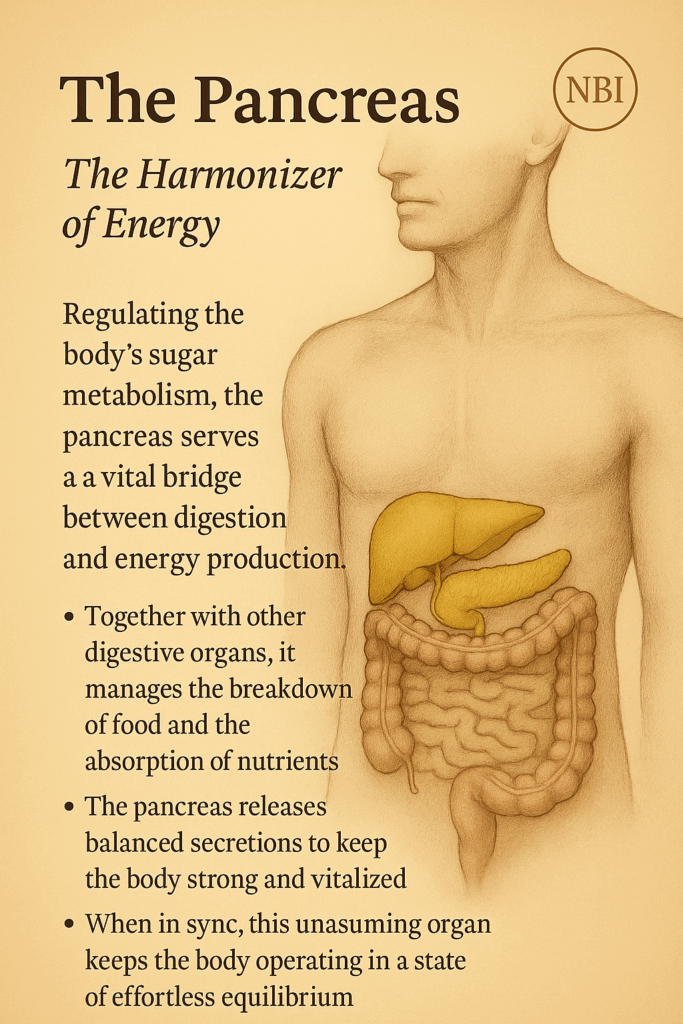The pancreas is one of the body’s most quietly influential organs. Positioned deep within the abdomen, tucked gently behind the stomach, it plays two essential roles that profoundly affect digestion, energy, and overall balance. Though rarely acknowledged in everyday conversation, the pancreas is a centre of coordination — assisting the breakdown of food and helping maintain stable blood sugar so the body can function with clarity and vitality. In Natural Hygiene, the pancreas is understood as a responsive organ that mirrors the state of the internal terrain and the habits of daily living.
As part of digestion, the pancreas produces enzymes that break down fats, proteins, and carbohydrates. These enzymes flow into the small intestine to ensure that food is converted into usable nutrients with ease. When the diet is clean, simple, and aligned with human physiology, the pancreas works gracefully, releasing just enough digestive support to help the body absorb what it needs. But when meals are heavy, complex, or difficult to digest, the pancreas must work harder, sending more enzymes to cope with the burden. Over time, this strain can lead to fatigue, bloating, gas, sluggish digestion, or discomfort after meals. These sensations are not disorders; they are communication — the body signalling that its digestive capacity has been exceeded.
The pancreas also has a second role: regulating blood sugar. It does this by releasing substances that allow the body to move sugar from the bloodstream into the cells. When the diet is harmonious — built around fruits, vegetables, water-rich foods, and simple combinations — the pancreas responds effortlessly. Natural sugars from fruit are easily managed because they arrive in the body packaged with water, fibre, minerals, and living enzymes that support their assimilation. In Natural Hygiene, fruit is understood as the most digestible and appropriate source of natural sugar for human physiology.
Problems arise not from fruit, but from the modern diet. Refined sugars, stimulants, processed foods, high-fat meals, and animal products all disrupt the pancreas’s ability to maintain balance. Excess fats, in particular, coat the cells and slow the movement of sugar into them, forcing the pancreas to work harder to restore equilibrium. Over time, this can lead to cravings, energy crashes, irritability, or fluctuating blood sugar sensations. These are signals of a terrain asking for clarity, hydration, and natural food, not signs of inherent defect.
Emotionally, the pancreas is sensitive to stress and overstimulation. When the nervous system is activated for long periods, digestion slows, circulation shifts, and pancreatic function becomes disrupted. Many people notice that emotional eating, late-night meals, or periods of worry lead to digestive discomfort or fluctuating energy. This is because the pancreas responds directly to the internal environment — both physical and emotional.
Fasting is deeply restorative for the pancreas. When digestion pauses, the pancreas can rest from enzyme production and blood sugar regulation. Without constant stimulation from food, the body begins repairing cells, clearing fats from the bloodstream, and restoring balance. Many people experience a striking improvement in digestive comfort, energy stability, and mental clarity after a period of fasting. This is the pancreas returning to its natural rhythm.
Movement, too, supports pancreatic health. Gentle walking after meals, stretching, and breathing practices all increase circulation through the abdomen and improve the body’s ability to transport sugar into the cells. Sunshine activates natural biochemical pathways that help regulate energy. Hydration — especially through water-rich fruits — is one of the most powerful supports for the pancreas, helping thin the blood, reduce metabolic burden, and ease digestion.
As the terrain becomes cleaner, the pancreas begins to thrive again. Digestion becomes smoother. Energy becomes more stable. The emotional relationship with food softens, becoming more intuitive and aligned with the body’s needs. People often describe feeling lighter, clearer, and more balanced when the pancreas is relieved of constant overload. This is because the pancreas flourishes when the body is given the conditions for natural functioning: simplicity, rest, hydration, movement, and stress reduction.
The pancreas teaches us the importance of ease. It shows us that health is not created through force but through alignment. When digestion is relaxed, when meals are simple, when hydration is plentiful, and when emotions are calm, the pancreas works in harmony with the rest of the body. It is not a fragile organ but a responsive one — one that reflects the choices and rhythms of daily life.
The pancreas is more than a digestive helper or a regulator of blood sugar. It is the keeper of digestive ease, the stabiliser of energy, and a guardian of internal harmony. When we honour its needs, the whole body moves into balance.

